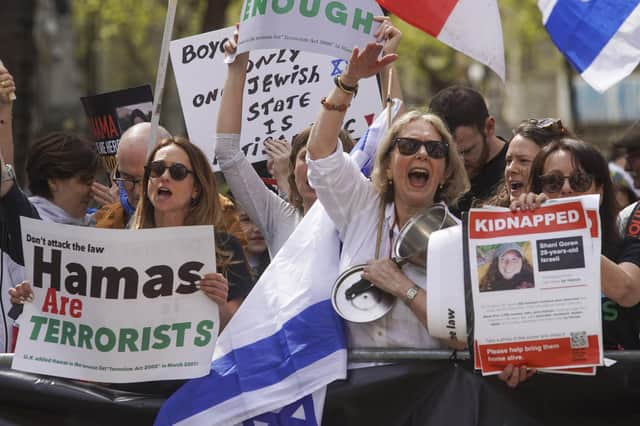Church of Ireland archbishops pray for Middle East peace amid Iran attacks on Israel


The churchmen’s plea comes as an Israeli military spokesman said 99% of more than 300 Iranian drones, cruise missiles and ballistic missiles had been shot down outside the country's borders, with aircraft intercepting more than 10 cruise missiles.
A statement from Archbishop John McDowell and Archbishop Michael Jackson said: “We renew our call for members of the Church of Ireland to pray that peace will prevail and humanitarian aid will reach all who suffer at this time.
Advertisement
Hide AdAdvertisement
Hide Ad“Every human life has intrinsic value through its creation in the image of God. Our brothers and sisters in the Anglican Diocese of Jerusalem continue, with great courage, to welcome and help people in need – regardless of their faith or background – in Israel, Palestine, Lebanon, Syria and Jordan, through its hospitals, schools, clinics and rehabilitation centres.
“We also remember in prayer all from our island who serve the cause of peace in the region and those whom they keep safe”.
In the wake of the unprecedented attack by the Islamic Republic, Israel has hailed its successful air defences, saying it and its allies – including the UK – thwarted 99% of the more than 300 drones and missiles launched towards its territory.
However, regional tensions remain high, amid fears of further escalation in the event of a possible Israeli counter-strike.
Advertisement
Hide AdAdvertisement
Hide AdUS President Joe Biden said he would convene a meeting of the Group of Seven advanced democracies on Sunday “to co-ordinate a united diplomatic response to Iran’s brazen attack”.
The language indicated that the Biden administration does not want Iran’s assault to spiral into a broader military conflict.
A top US official said the US had informed Israel it did not plan on striking Iran itself.
Iran launched the attack in response to a strike widely blamed on Israel on an Iranian consular building in Syria earlier this month which killed two Iranian generals.
Advertisement
Hide AdAdvertisement
Hide AdIsrael said Iran launched 170 drones, more than 30 cruise missiles and more than 120 ballistic missiles early on Sunday.
By Sunday morning, Iran said the attack was over and Israel reopened its air space.
The two foes have for years been engaged in a shadow war marked by incidents such as the Damascus strike.
But Sunday’s assault, which set off air raid sirens across Israel, marked the first time Iran has launched a direct military assault on Israel, despite decades of enmity dating back to the country’s 1979 Islamic Revolution.
Advertisement
Hide AdAdvertisement
Hide AdIsrael has over the years established – often with the help of the United States – a multi-layered air defence network that includes systems capable of intercepting a variety of threats including long-range missiles, cruise missiles, drones and short-range rockets.
Some of the worst violence ever seen in the region erupted on October 7th last year when the terror group Hamas – which is backed by the Islamic Republic of Iran – attacked Southern Israel.
The group attacked a musical festival and rural communities in the country, killing 1,139 and abducting dozens.
It is believed around 100 are still held by Hamas and other Palestinian Islamist groups.
Advertisement
Hide AdAdvertisement
Hide AdThe UK government described it as the most appalling attack in Israel’s history, the worst loss of Jewish life since the Second World War.
The Hamas-run health ministry says 33,686 people have been killed since the Israeli invasion of Gaza began.
At least 460 Palestinians have been killed by Israeli forces or settlers in the West Bank since the Hamas terror attack in October.
Israeli sources have told the BBC that least 13 Israelis have been killed in the West Bank by Palestinians in the same period.
Advertisement
Hide AdAdvertisement
Hide AdIsraeli Prime Minister Benjamin Netanyahu posted a short message on X, saying: “We intercepted. We blocked. Together, we will win.” Defence minister Yoav Gallant said: “This campaign is not over yet. We need to remain vigilant … and to prepare for any scenario”.
Comment Guidelines
National World encourages reader discussion on our stories. User feedback, insights and back-and-forth exchanges add a rich layer of context to reporting. Please review our Community Guidelines before commenting.